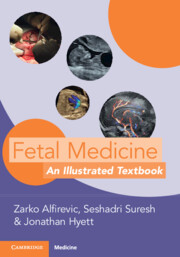Book contents
- Fetal Medicine
- Fetal Medicine
- Copyright page
- Contents
- Contributors
- Acknowledgments
- Chapter 1 Fetal Anatomy
- Chapter 2 Screening for Common Chromosomal Abnormalities and Other Genetic Conditions
- Chapter 3 Fetal Anatomy
- Chapter 4 Small for Gestational Age (SGA) and Fetal Growth Restriction
- Chapter 5 Large for Gestational Age (LGA) Fetus
- Chapter 6 Rhesus Disease
- Chapter 7 Fetal Alloimmune Thrombocytopenia
- Chapter 8 Hydrops in Second and Third Trimester
- Chapter 9 Abnormal Placenta
- Chapter 10 Umbilical Cord Abnormalities
- Chapter 11 Amniotic Fluid Abnormalities
- Chapter 12 Multiple Pregnancy
- Chapter 13 Short Cervix in Asymptomatic Women
- Chapter 14 Fetal Infections
- Chapter 15 Drugs in Pregnancy and Teratogenesis
- Chapter 16 Ultrasound Guided Invasive Diagnostic and Therapeutic Procedures
- Chapter 17 Fetoscopy and Ultrasound Guided Thermal Therapeutic Procedures
- Chapter 18 Fetal Surgery for Spina Bifida
- Chapter 19 Genetic Syndromes
- Chapter 20 Termination of Pregnancy for Fetal Abnormality
- Index
- References
Chapter 15 - Drugs in Pregnancy and Teratogenesis
Published online by Cambridge University Press: 08 June 2023
- Fetal Medicine
- Fetal Medicine
- Copyright page
- Contents
- Contributors
- Acknowledgments
- Chapter 1 Fetal Anatomy
- Chapter 2 Screening for Common Chromosomal Abnormalities and Other Genetic Conditions
- Chapter 3 Fetal Anatomy
- Chapter 4 Small for Gestational Age (SGA) and Fetal Growth Restriction
- Chapter 5 Large for Gestational Age (LGA) Fetus
- Chapter 6 Rhesus Disease
- Chapter 7 Fetal Alloimmune Thrombocytopenia
- Chapter 8 Hydrops in Second and Third Trimester
- Chapter 9 Abnormal Placenta
- Chapter 10 Umbilical Cord Abnormalities
- Chapter 11 Amniotic Fluid Abnormalities
- Chapter 12 Multiple Pregnancy
- Chapter 13 Short Cervix in Asymptomatic Women
- Chapter 14 Fetal Infections
- Chapter 15 Drugs in Pregnancy and Teratogenesis
- Chapter 16 Ultrasound Guided Invasive Diagnostic and Therapeutic Procedures
- Chapter 17 Fetoscopy and Ultrasound Guided Thermal Therapeutic Procedures
- Chapter 18 Fetal Surgery for Spina Bifida
- Chapter 19 Genetic Syndromes
- Chapter 20 Termination of Pregnancy for Fetal Abnormality
- Index
- References
Summary
This chapter starts with definitions of teratogens and susceptibility of a fetus to a teratogenic insult depending on the phases of the exposure. The basic principles of counselling regarding drug use in pregnancy are outlined. Risks of congenital malformations are presented in a tabular form for the following classes of drugs: antibiotics, anticoagulants, antidepressants, antipsychotics and mood stabilisers, antiepileptics, antihypertensives, autoimmune disease drugs, chemotherapy agents, abortifacients, vitamins.
Possible teratogenic effects of substance misuse and ionising radiation are also included.
- Type
- Chapter
- Information
- Fetal MedicineAn Illustrated Textbook, pp. 381 - 398Publisher: Cambridge University PressPrint publication year: 2023



